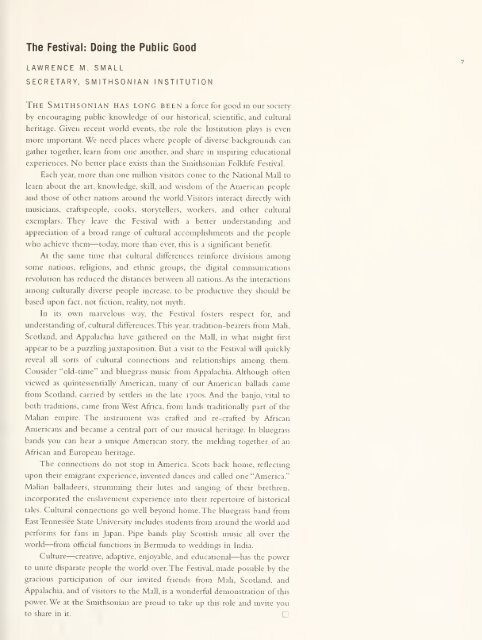SCOTLAND - Smithsonian Digital Repository - Smithsonian Institution
SCOTLAND - Smithsonian Digital Repository - Smithsonian Institution
SCOTLAND - Smithsonian Digital Repository - Smithsonian Institution
You also want an ePaper? Increase the reach of your titles
YUMPU automatically turns print PDFs into web optimized ePapers that Google loves.
The Festival: Doing the Public Good<br />
LAWRENCE M. SMALL<br />
SECRETARY, SMITHSONIAN INSTITUTION<br />
The <strong>Smithsonian</strong> has long been a force for good in our society<br />
by encouraging public knowledge of our historical, scientific, and cultural<br />
heritage. Given recent world events, the role the <strong>Institution</strong> plays is even<br />
more important. We need places where people of diverse backgrounds can<br />
gather together, learn from one another, and share in inspiring educational<br />
experiences. No better place exists than the <strong>Smithsonian</strong> Folklife Festival.<br />
Each year, more than one million visitors come to the National Mall to<br />
learn about the art, knowledge, skill, and wisdom of the American people<br />
and those of other nations around the world. Visitors interact directly with<br />
musicians, craftspeople, cooks, storytellers, workers, and other cultural<br />
exemplars. They leave the Festival with a better understanding and<br />
appreciation ot a<br />
broad range of cultural accomplishments and the people<br />
who achieve them—today, more than ever, this is<br />
a significant benefit.<br />
At the same time that cultural differences reinforce divisions among<br />
some nations, religions, and ethnic groups, the digital communications<br />
revolution has reduced the distances between aU nations. As the interactions<br />
among culturally diverse people increase, to be productive they should be<br />
based upon fact, not fiction, reality, not myth.<br />
In its own marvelous way, the Festival fosters respect for, and<br />
understanding of, cultural differences. This year, tradition-bearers fi-om Mali,<br />
Scotland, and Appalachia have gathered on the Mall, in what might first<br />
appear to be a puzzling juxtaposition. But a visit to the Festival will quickly<br />
reveal all sorts of cultural connections and relationships among them.<br />
Consider "old-time" and bluegrass music from Appalachia. Although often<br />
viewed as qumtessentially American, many of our American ballads came<br />
from Scotland, carried by settlers in the late 1700s. And the banjo, vital to<br />
both traditions, came from West Africa, from lands traditionally part of the<br />
Malian empire. The instrument was crafted and re-crafted by African<br />
Americans and became a central part of our musical heritage. In bluegrass<br />
bands you can hear a unique American story, the melding together of an<br />
African and European heritage.<br />
The connections do not stop in America. Scots back home, reflecting<br />
upon their emigrant experience, invented dances and called one "America."<br />
Mahan baUadeers, strumming their lutes and singing of their brethren,<br />
incorporated the enslavement experience into their repertoire of historical<br />
tales. Cultural connections go well beyond home. The bluegrass band from<br />
East Tennessee State University includes students from around the world and<br />
performs for fans in Japan. Pipe bands play Scottish music all over the<br />
world—from official functions in Bermuda to weddings in India.<br />
Culture—creative, adaptive, enjoyable, and educational—has the power<br />
to unite disparate people the world over. The Festival, made possible by the<br />
gracious participation of our invited friends from Mah, Scotland, and<br />
Appalachia, and of visitors to the Mall, is a wonderful demonstration of this<br />
power. We at the <strong>Smithsonian</strong> are proud to take up this role and invite you<br />
to share in it.
















